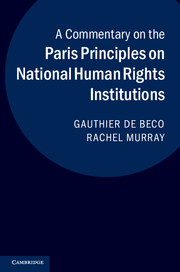Book contents
- Frontmatter
- Contents
- Foreword
- List of abbreviations
- Part I Background: history and challenges
- Part II Commentary principle by principle
- Part III Twenty years later: the future of the Paris Principles
- 10 An evaluation of the Paris Principles
- Annex I Principles relating to the status of national institutions (The Paris Principles)
- Annex II ICC General observations as at May 20131
- Bibliography
- Index
- References
10 - An evaluation of the Paris Principles
from Part III - Twenty years later: the future of the Paris Principles
Published online by Cambridge University Press: 05 November 2014
- Frontmatter
- Contents
- Foreword
- List of abbreviations
- Part I Background: history and challenges
- Part II Commentary principle by principle
- Part III Twenty years later: the future of the Paris Principles
- 10 An evaluation of the Paris Principles
- Annex I Principles relating to the status of national institutions (The Paris Principles)
- Annex II ICC General observations as at May 20131
- Bibliography
- Index
- References
Summary
The Paris Principles have gained international, regional and domestic legitimacy as the template and “dominant model’ against which to measure an NHRI and to permit an NHRI’s participation in UN and regional meetings. Indeed, the literature – documents of the UN and other bodies – “has been almost completely marked…by a fundamental fidelity to the United Nations conception of the ideal or optimal NHRS”. The Paris Principles are now more than mere provisions annexed to a UN General Assembly Resolution. The interpretation by the SCA in its General Observations adds a further depth, detail and complexity to their rather generic and sometimes vague content. Taken together, do the Paris Principles and the SCA General Observations now reflect an appropriate contemporary template for NHRIs? Furthermore, as the various chapters have shown, the Paris Principles have their limitations in content and approach. The question therefore arises: to what extent are they still fit for purpose twenty years on?
What are the Paris Principles for?
What was the purpose of the Paris Principles when they were adopted? The UN General Assembly Resolution to which the Paris Principles were annexed notes they were adopted as part of an examination of “ways and means of promoting technical assistance for the cooperation and strengthening of national institutions”. They arguably have a range of functions: they are a tool to enable NHRIs to engage at the international and regional levels on a different footing from government and CSOs and, in so doing, provide a “vital reference point” or “normative template establishing the criteria for international acceptance of an NHRI”. The Principles also assist States in identifying relevant generic criteria to establish an NHRI in their jurisdictions. Are they now also intended to assist NHRIs themselves to become effective, credible and legitimate bodies? To what extent can they achieve all of these goals, and are they appropriately designed to do so?
- Type
- Chapter
- Information
- Publisher: Cambridge University PressPrint publication year: 2014



